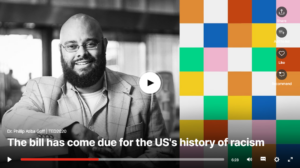Abolition, Black Studies, and the Law

“If we don’t take a full accounting of these debts that are owed, then we are going to keep paying it. Holding the weight of that individually and collectively is just too much. The solution can’t be just incremental reform.”
– Dr. Phillip Atiba Goff
On behalf of The Department of African American Studies, we invite you to join us for a conversation about police abolition. This event, part of a series on this topic, will feature two of the leading scholars in conversations on police reform and the enduring legacies of racial violence. In conversation with Nikki Jones, Professors Phillip Goff and Geoffrey Ward will consider the role of social scientists working within/alongside Black Studies in confronting the crisis of policing today.
Abolition, Black Studies, and the Law
Monday, March 1, 2021
12:00-1:15 P.M. PST
Geoff Ward is a historical sociologist whose scholarship examines the racial politics of social control and pursuit of racial justice, historically and today, with a focus on racial violence, youth justice, and representative legal authority. In addition to research articles and essays, he is the author of The Black Child-Savers: Racial Democracy and Juvenile Justice (University of Chicago Press, 2012), an award-winning book on the rise, fall, and lasting remnants of Jim Crow juvenile justice. Current projects examine broader histories of racial violence, their legacies, and implications for redress. Read more
Phillip Atiba Goff is the Co-founder and CEO of the Center for Policing Equity, and a Professor of African-American Studies and Psychology at Yale University. He received his AB from Harvard and PhD in Psychology from Stanford. He quickly became a national leader in the science of racial bias by pioneering scientific experiments that exposed how our minds learn to associate Blackness and crime implicitly—often with deadly consequences. Read more
Nikki Jones is a Professor of African American Studies at UC Berkeley. Her work focuses on the experiences of Black women, men, and youth with the criminal legal system, policing, and violence. Professor Jones is the author of two books: Between Good and Ghetto: African American Girls and Inner-City Violence(2010) and The Chosen Ones: Black Men and the Politics of Redemption (2018). Her current research includes the analysis of interviews with police officers and video recordings of routine police encounters with the public, with a focus on encounters that involve the police and Black youth in high-surveillance neighborhoods. Read more
| The Critical Conversations Spring 2021 series is organized around two themes: celebrating the life and legacy of Dr. Barbara T. Christian, an architect of Black feminist criticism, a founding member of our Department and a gifted writer and teacher; and exploring the concept of “abolition democracy,” thinking creatively and collaboratively about the practice of abolition as necessary to building life-affirming institutions and robust democratic structures.
Through both themes, we ask: what are the lessons of the Black Feminist, Black Radical, and Black intellectual traditions for our moment and what is the role of Black Studies in building more just futures? |
SUGGESTED PRE-EVENT LEARNING
 |
The bill has come due for the unpaid debts the United States owes its Black residents, says Dr. Phillip Atiba Goff, CEO of the Center for Policing Equity (CPE). But we’re not going to get to where we need to go just by reforming law enforcement. |
| The Chosen Ones: Black Men and the Politics of Redemption Author: Nikki Jones In The Chosen Ones, sociologist and feminist scholar Nikki Jones shares the compelling story of a group of Black men living in San Francisco’s historically Black neighborhood, the Fillmore. Against all odds, these men work to atone for past crimes by reaching out to other Black men, young and old, with the hope of guiding them toward a better life. Yet despite their genuine efforts, they struggle to find a new place in their old neighborhood. With a poignant yet hopeful voice, Jones illustrates how neighborhood politics, everyday interactions with the police, and conservative Black gender ideologies shape the men’s ability to make good and forgive themselves—and how the double-edged sword of community shapes the work of redemption. Learn more |
 |
|
Where Lynching Terrorized Black Americans, Corporal Punishment In Schools Lives On
The history of state-sanctioned violence against Black people in Mississippi is as old as the state itself. Hundreds of years later, state- and school-sanctioned brutality against Black people is baked into the fabric of the community. a new study by Professor Aaron Kupchik, and Professor Geoff Ward makes a compelling case that these two acts of violence are related. As millions of Americans protest police violence and racism against Black people after the killings of George Floyd and Breonna Taylor, the study’s findings are especially urgent, connecting racial violence in the past with brutality against Black people today. |
